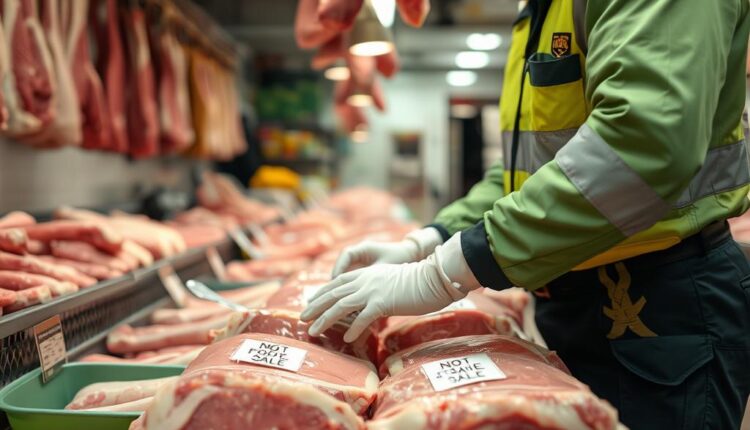Rotten Meat Scandal: A Betrayal of Health and Faith in the Valley
Malik Nazir
The cherished image of Kashmir’s rich culinary heritage has been brutally tarnished. Recent shocking revelations, brought to light through the vigilant action of the Food Safety Department, have exposed an alarming reality. Rotten meat has been sold to unsuspecting consumers in large quantities. Official figures suggested that Kashmir consumes 60,000 tonnes of mutton annually and half of the supplies come from outside.
Whether sourced from outside Kashmir or processed locally in bulk, this tainted meat found its way into popular traditional dishes like Kebabs, Ristas, and Gushtabas. Finding rotten meat being sold as food is horrifying in itself, but the threat runs deeper. While the seizure of such items is a necessary first step, it merely scratches the surface of a deeper and more dangerous problem which is the largely unregulated chicken supply chain in the Valley.
Every single day, tonnes of chicken make their way into the Valley without labels, without health checks, and without any system of traceability. A significant portion of restaurants, street-side eateries, and even hospital canteens—places with the highest footfall and the most vulnerable consumers—depend on such unlabelled and unverified chicken. In many cases, the meat is purchased as pre-dressed or boneless cuts, offered at attractive prices, but without a shred of documentation to prove its quality, freshness, safety, or even its halal certification.
In a region like Kashmir, this practice is more than just a regulatory lapse—it is a direct threat to public health and a matter of deep religious sensitivity. When poultry is sold without proper labelling, storage information, or veterinary inspection, consumers are left completely in the dark about its source and condition. Eating meat that is spoiled, contaminated, or handled in unhygienic conditions can lead to severe foodborne illnesses, some of which may be life-threatening.
Beyond the health dangers, for a Muslim-majority population, the absence of halal assurance is a serious spiritual concern. In Islam, knowingly consuming non-halal food is a grave sin, and providing such meat for profit, while concealing its origins, shows an alarming disregard for both public trust and divine accountability. It is not merely a question of commerce—it is a question of conscience, ethics, and faith.
Those who may have unknowingly consumed unsafe or non-halal food should seek forgiveness and vow to be more cautious in the future.
The Food Safety Department’s recent crackdown is welcome but also raises a troubling question. How did such meat make it to the market in the first place? Under FSSAI guidelines, the department has a duty to ensure safety at every stage of the supply chain. Unlabelled chicken still flows freely into restaurants exposing a glaring failure in prevention.
We already have a complete food safety system in place, but what is urgently needed is its effective implementation on the ground through regular surprise inspections of all food outlets, mandatory labelling and traceability for all meat and poultry, well-equipped local testing labs, strict licensing with routine audits, and severe penalties such as jail terms and permanent business closures for serious offenders.
Temporary crackdowns will not restore trust. Routine checks must extend beyond meat to cover chicken, medicines, edible oils, spices, and other essentials
However, government action alone cannot solve the problem. Public awareness is equally crucial. Communities should be educated through schools, mosques, media, and local initiatives about food safety, halal standards, license verification, and recognizing signs of spoiled meat. Trader federations and associations should refrain from defending the indefensible and instead cooperate fully with authorities.
Religious leaders and scholars must continue to use every platform—Friday sermons, community gatherings, and public talks—to remind people that deception in matters of food is not a minor wrongdoing but a grave sin condemned in all faith traditions. Honesty and transparency in what we consume are as much a spiritual obligation as they are a civic duty.
At the same time, consumers themselves cannot remain passive. Each individual has a responsibility to ask questions about the source of the meat they purchase, to choose only those outlets that display valid halal and safety certifications, and to immediately report any suspicious or unhygienic practices to the concerned authorities.
The path to safer, cleaner, and permissible food is not the responsibility of government alone—but active participation from every citizen. Only through this collective vigilance can we safeguard our society, uphold our shared values, and ensure that what ends up on our plates is not just lawful in faith, but also healthy for our bodies. Ultimately, this issue goes far beyond the question of a single meal—it is about protecting our health, preserving our faith, and maintaining the dignity and integrity of our community.
The writer teaches at NM Boys Higher Secondary School, Bandipora, and can be reached at maliknazir.a@gmail.com.


Comments are closed.